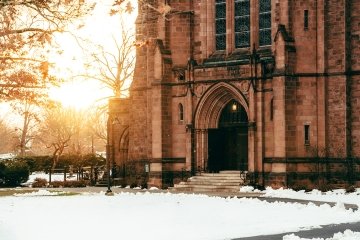Karen Hollis
- Professor Emeritus of Psychology

In her research, Karen Hollis explores the adaptive advantage of individual learning in non-human animals, integrating the psychological study of animal learning with an evolutionary approach to animal behavior. For some time she has been researching the way in which animals use learned signals to anticipate the appearance of biologically important events—such as food, rivals, predators and mates—and, thus, optimize their interaction with these events.
Hollis’ most recent research focuses on the role of learning in the predator-prey relationship between pit-digging larval antlions, insects that capture prey in carefully constructed pit traps, and ants, which often stumble into those traps. The competition between these predators and their prey has resulted, through natural selection, in behavior that aids antlions in capturing ants (and other prey) more efficiently, and aids ants in escaping antlion predation more effectively. This kind of competition between predator and prey often is called an “evolutionary arms race” because each side develops adaptations and counter-adaptations in an ever-escalating contest for survival. For example, Hollis and her students have shown that antlions can learn to anticipate the arrival of prey, an ability that provides antlions with an enormous predatory advantage. On the other side of this competition, some species of ants are able to rescue nestmates that fall into antlion pits using precisely directed and highly sophisticated maneuvers. These special rescue behaviors first were reported in 2009 by Hollis and her colleagues at Université Paris 13, in a paper that drew much international media attention, including coverage on the Discovery Channel’s Daily Planet show, Dutch Educational Television, and BBC Radio. More recently, in a paper selected as a “Featured Article” by the Executive Editors of the journal, Animal Behavior, the team also has demonstrated that ants of several Mediterranean species – but only those species whose foragers are likely to be captured by antlions – possess the ability to rescue their relatives. Closer to home, Hollis and her students have discovered rescue behavior in a North American species of ants (many nests of which are found just outside the Reese Psychology Building) and the lab now is focusing on the interactions between predator and prey more directly.
Hollis has served on the editorial boards of several scientific journals, including Animal Learning & Behavior, Journal of Comparative Psychology, Psychonomic Bulletin & Review and Behavioral Processes; and she has just completed a twelve-year term as Associate Editor of Learning & Behavior. In 2005, Hollis was elected president of Division 6 (Behavioral Neuroscience and Comparative Psychology) of the American Psychological Association (APA) and, in 2009, was elected president of APA’s Division 3 (Experimental Psychology), the first woman to occupy that position. More recently, she was elected to the APA Council of Representatives and has been invited to serve as Professeur invité at Université Paris 13 in the Laboratoire d’Ethologie Expérimentale et Comparée. The ICTS-RBD Program (Ministry of Science and Innovation, Government of Spain) awarded Hollis and her collaborator at Université Paris two grants, in 2010 and again in 2011, to conduct a comparative study of ants’ rescue behavior at the Doñana Scientific Reserve in Huelva, Spain.
Areas of Expertise
Psychology of learning; behavioral ecology; predator-prey relationships; learning in insects
Education
- Ph.D., University of Minnesota
- B.A., Slippery Rock State College


